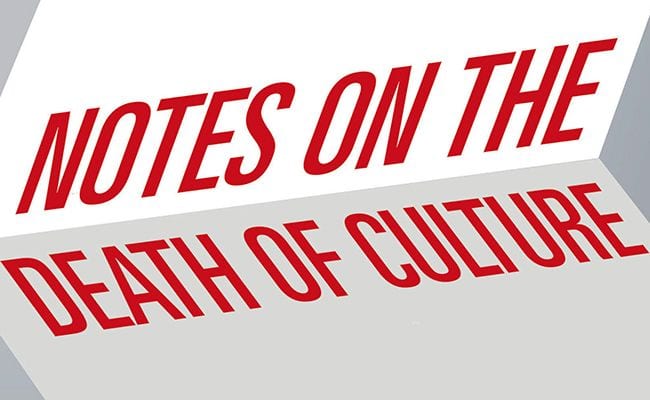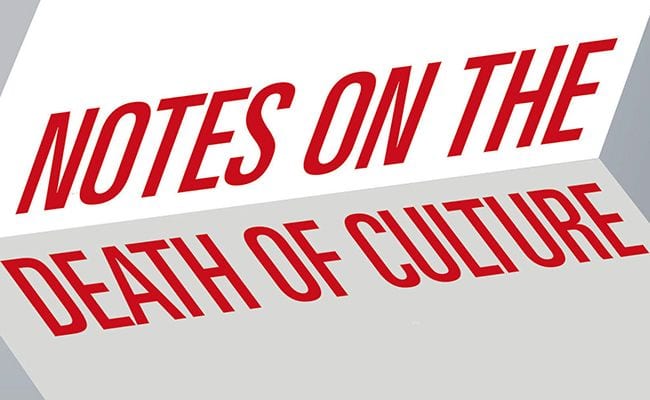
When one finishes Mario Vargas Llosa’s Notes on the Death of Culture, the reader is left surveying the cultural landscape and wondering if anything survived the blast. The book’s brevity and tone belies the seriousness of what Vargas Llosa is actually suggesting: that Culture is dead—or at least very near death.
Vargas Llosa’s thesis isn’t new (in fact, he draws admittedly on T.S. Eliot’s “Notes Towards the Definition of Culture”, originally published in 1948), but his eloquence and even the subtlety of his warning paradoxically make it seem more alarming. Although there is the early sense that surely Vargas Llosa is hyperbolic, by the end it’s difficult to reach any objective assessment that shows he’s entirely wrong, either. If Vargas Llosa’s thesis is true, perhaps hyperbole is justified.
When Vargas Llosa condemns the culture of spectacle that has invaded not only our film, television, and art, but our politics and news outlets, it isn’t with the feverish outrage of a man railing against a disoriented younger generation. More than anything, Vargas Llosa sounds deflated by the awareness that too few people will even recognize his distinction between Culture and culture (read: pop culture), between knowledge and information, or between spectacle and art.
Vargas Llosa points out a string of cultural developments so familiar to us that each one is hardly notable anymore. Of course cable news rushes to the spectacle over the substance! Of course sex has become so omnipresent that eroticism has become elusive! Of course our political campaigns are as polished and hollow as steakhouse advertisements!
Vargas Llosa isn’t wrong, of course, and it’s his correctness that makes the book so difficult and at the same time so refreshing to read. Living in a world where a braggadocious reality television star is seen as electable, where 20-somethings write memoirs, where entire seasons of television are consumed as rapidly as bowls of cereal, Vargas Llosa wants us to ask ourselves: From where are we drawing our cultural artifacts, and what are the criteria for their inclusion, anymore?
The false equivalency between Culture and pop culture is only part of the problem for Vargas Llosa. More important is the decay within traditional Culture itself—from the celebration of giants like Jean Baudrillard and Michel Foucault to the elimination of any objective, meaningful standards by which to judge art and literature. Vargas Llosa warns that the only way to accomplish a “democratization of culture” through education is to destroy it. When even our vaunted institutions like Columbia University remove Ovid from the curricula due to his “problematic” content, it’s difficult to argue with the author.
Notes on the Death of Culture begins “quietly”, if you will, but by the end of it, Vargas Llosa writes with a fierce tone, as he defends the need for both an uncompromisingly secular order to society and for a robust spiritual tradition. He lays Culture’s death at the feet of many causes but pointedly concentrates on “the evisceration of spiritual life”, the lack of conviction in our democratic institutions and in capitalism’s value, the misguided excesses of multiculturalism, the democratization of cultural taste and, of course, the culture of spectacle.
In his “Final Thoughts”, Vargas Llosa describes himself as melancholic. There is an unmistakable tension at the heart of his melancholy between awareness that pop culture is missing something and his belief that Culture has been defrauded by confidence men masquerading as artists and intellectuals. He wavers back and forth between resignation and hope, ultimately settling somewhere closer to hope. “There is still time to put things right,” Vargas Llosa writes at last and it’s his moral obligation as a writer and intellectual—one still capable of recognizing true Culture and its indispensable value to all of mankind—to say something.
But is a book deploring the democratization of Culture for everyone? Of course not, Vargas Llosa would say. Buried in his uncertain eulogy for Culture, there’s a phrase he uses to describe news outlets unwilling to cater to the basest, shallowest interests of readers. Those that don’t debase their content, Vargas Llosa writes, run “the risk of losing this audience and addressing only ghosts.” In the end, Notes on the Death of Culture is written in the tenor of a man all too aware that he’s largely addressing ghosts.


![Call for Papers: All Things Reconsidered [MUSIC] May-August 2024](https://www.popmatters.com/wp-content/uploads/2024/04/all-things-reconsidered-call-music-may-2024-720x380.jpg)



